- Home
- Michelle Hodkin
The Becoming of Noah Shaw
The Becoming of Noah Shaw Read online
For the lost boys, and the girls who find them
Caveat Emptor
TRIGGER WARNING FOR SUICIDE, HOMICIDE, assault with a deadly weapon, assault with a deadly mind, harm to others, harm to self, disordered eating, disordered thinking, disordered feeling, disordered being, body shaming, victim shaming, shaming of every kind, dark humor, ill humor, shitty humor, maiming, miming, death of teenagers, death of adults, death of authority figures, death of inconsequential red shirts. Also sex. But if you need a trigger warning for that, you’re reading the wrong book.
Part I
Rather than love, than money, than fame, give me truth.
—Henry David Thoreau, Walden
My dear friend,
Sincere apologies for my lack of correspondence, but the journey has been long and, as of late, rather fraught.
You did admit that this would not be an easy . . . venture, though I must confess that I did not expect that to mean I would arrive in Calcutta as one of only three survivors of the steamer Ceres.
The first man to go missing was a merchant; no man aboard could speak to the manner of his disappearance, and prior to our voyage he was unknown to the captain and crew, all steady-seeming fellows. A search of the ship was conducted, and when he was not to be found, the captain concluded he must have fallen overboard in the night.
When the captain vanished eight days later, no one aboard could say the same.
The Ceres left London with twenty-one men aboard, including myself. As advised, I have concealed the true nature of our venture to all who would ask, even members of the Company. I expect to be questioned, come morning, about the events of the past two months, and all papers are in order. I have told my wife little more than was necessary—that I believed this journey would prove prosperous, and I do still hope that to be the case, though it is not my fortune but my fate—and that of many others—I hope to improve. Though only you are aware of that truth.
Yours Respectfully,
S. S.
1
CONQUER OR DIE
WE ARE A TEARLESS, TINY crowd, we survivors of David Shaw.
Imagine it: five of us gathered like a wilting bouquet, my grandmother the lone thistle standing.
Next to her, my grandfather softly droops under the grand dome above us, painted by some hideously famous artist centuries ago. This is quite literally our ancestral home, built in the fifteen hundreds by Henry the Somethingth. Grandfather, a.k.a. Lord Elliot II, was once a strapping, reed-backed but jolly Englishman’s Englishman. Hunter of pheasants, of foxes, but not of fortune—that he inherited from his father, who inherited it from his father, and on it goes. Now, however, he sags beside my grandmother, half of his face twisted into a permanent grimace after a stroke two years ago. I tried to heal him when that was a thing I realised I could do. It didn’t work. I still don’t know why.
His light blue eyes are clouded over and staring at nothingness as he leans on his cane, his hand trembling. My grandmother can’t quite disguise her pleasure at the optics of our black-frocked family standing on the grand staircase of the grand entrance as we pretend to wait for the cars in full view of the mourners passing by on foot. Never mind that my grandfather can’t do steps—Lady Sylvia could not care less.
Imagine, if you will, a sharper, crueler version of Maggie Smith, and you’ll have some semblance of an idea of my grandmother. Add an unhealthy dose of botulinum toxin, and there’s your visual.
Standing beside the remains of my family, I’ve never felt more like a stranger. My stepmother, Ruth, grips my sister Katie’s hand as the valet helps my grandfather descend to the car—for my sister’s sake more than her own. My stepmother seems quite fine, actually, enduring this hideousness as if it were any other day with my grandparents—she’s had years of practice being a lowly American, and my father’s second wife at that. My sister, however—her ocean blue eyes are dull and clouded, staring at nothing, and dressed in black, she looks mostly dead herself; she hardly notices when my stepmother breaks away to head to the chapel on her own. We should be going with her, but my grandmother insisted on this arrangement (separate cars for second wives), and Ruth either didn’t care enough to protest, or knew better.
The eighteenth-century chapel is on the grounds of the estate, only about a half a kilometre away—its spire pierces the English sky (grey, sunless, speckled with the occasional crow). A carefully landscaped wood helps obscure the twelfth-century ruins of the abbey that preceded it. Grandmother finds the ruins unsightly, unsurprisingly, but the National Trust entered into an arrangement with some skint ancestor or another—maintaining castles isn’t cheap—and thus prevented her from fucking up that which should not be fucked with. I’m rather sentimental about the ruins—as a child, I halfheartedly attempted suicide there now and again, always returning from post-tourist-hours expeditions with knees winking with cuts, and the occasional fracture or two.
“All right, children.” My grandmother clasps her hands together as the car comes to a stop. “The carriage will begin the procession once everybody is assembled at the chapel. All you need do is wait until the casket is carried inside, then sit in the front left pew. Is that understood?”
My father’s affectless, emotionless voice is echoed in hers, and she speaks as though it were not her dead son we were gathered here to mourn, but rather a play we’re about to put on. If I were capable of feeling anything at the moment, I think I might hate her.
“Yes, Grandmother,” Katie says.
My turn. “Understood,” I say.
“Perfect.” She arranges her and my grandfather’s iron hair, along with his suit. The chapel doors are open, and a small crowd awaits the carriage hearse within and without. The valet exits our now-idling car to help my grandfather, and when the door opens—
The air is swollen with sound, more heartbeats than I can count, the threads of at least a hundred pulses quickening, the air itself seeming to inhale and exhale with each breath taken behind the stone walls. I can hear the tiny hearts of birds—crows, pheasant, pigeons, distinct from the hawk slicing the air above us. The knotty-wood-and-iron door opens, and it’s like cracking open a hive of bees—whispers and coughs and echoes, every note bursting and lurid. An old, dull impulse to place my hands over my ears and scream like I (very occasionally) did when I was a boy arises, but my ears were never the problem. My mind is.
What it usually feels like to be me:
The sounds I shouldn’t be able to hear skim off the surface of my mind. Everything is white noise until I focus, until something seizes my attention, but this, right now—it’s nothing like that. This feels like an assault, a mess of sounds, like being surrounded by instruments being smashed. It’s distracting enough that I hadn’t noticed the dozens of heads twisted over shoulders to glance at our Long-Expected Party. And lo, among them stands Goose.
The volume of the noise blurs my vision for a moment—crowds are always awful, but it’s especially worse today—and Goose is nothing more than a fall of blond hair and an open smile, flanked by the smudges of Patrick and Neirin. There’s a thunderclap of a hand on my shoulder. “Hard luck, mate,” says Goose, his voice deep and rather astonishingly resonant, rising above the din.
“We’re so sorry,” Patrick follows. A simple nod from Neirin.
Those three faces, none alike in dignity or feature: Goose light and lanky and loud; Neirin dark and soft and innocent; and ginger red and freckled Patrick.
Patrick and Neirin seem frozen in time—their faces the same as they were nearly three years ago when I left Westminster. I see snapshots of memories with their faces: Goose flashing his middle finger at me in Yard; Patrick rolling his first cigarette with ferocious concentration; Neirin s
cratching at maths problems, his face pinched with concentration.
And then me, holding a champagne sabre, spraying hundreds of pounds’ worth down open throats. Putting my cigarette out in the horsehair pancake to the collective horror of the teachers and students assembled for the Greaze, and the four of us snorting lines of coke Patrick shyly produced from his pocket, off his iPad in his father’s study.
We were not a foursome. For that, we’d need to be bonded by secrets, and I shared none of mine. Secrets cut you off from everyone else, so I would always suggest the vast majority of our exploits to mask that I never could quite connect with them in the first place. Insert a stifled sob here, would you?
A forked tongue clicks beside my ear. “It’s almost time,” my grandmother says, looking at the valet for confirmation, then at my stepmother. With a tiny crunch of a nod she looks ahead, toward the manor house, toward the old stables, ancient but fortified over the centuries. From the gate, four glossy Friesians emerge, a driver in a top hat commanding them, and my father’s coffin encased in a black wood and glass hearse behind.
I can’t see all that well from here—my head is still fizzing with sounds, whispers and coughs and everything else. But not Mara.
The way she sounds, the way she’s always sounded—like one discordant note, twisted just enough to affect the notes surrounding it—is impossible to ignore. An aural fingerprint, distinctly her own, distinctly Mara. The first time I heard her, I never wanted to listen to anyone else.
I look and listen for that note as the horses’ hooves knock the ground in a steady, dignified trot, their large hearts pumping solidly with the effort. I can almost feel their boredom as they approach, which is why, halfway down the path, the ripple of terror and rage in their bodies reverberates in mine. They break their gait, stopping, stamping—one backs up, another sidesteps into another horse. Then one of them rears, nearly snapping the harness. The colour of Katie’s face is ash, her heartbeat racing the way the horses want to.
“It’s all right,” I say reflexively, and my sister snaps her head toward me and slits her eyes. There’s anger there, fighting for a place beside her sadness. Today is changing her, has changed her already.
My grandmother holds tight to my grandfather’s arm, her face a mask of placidity as her blood ices with anger. She looks to the priest, who says something to the people in a vain attempt to calm them, because the horses begin to thunder toward the chapel, eliciting screams despite being several lengths away. I can feel the power of them in the ground. They’re about to turn sharply to their right, cracking into the woodlands just before they do it, just before the hearse overturns.
I know what they’re going to do before they do it, because at that moment I hear Mara, see her running toward us, diagonally through the hedges that enclose the gardens and past the Atlas fountain, and as her path begins to converge with the carriage, the horses blaze with panic. My eyes meet Mara’s, and she stops short. Looks at the horses, then back at me.
It’s her they’re terrified of. I know it, she knows it, and so she vanishes as swiftly as she arrived.
I don’t wait for anyone to calm the horses, or for the pallbearers to fetch the coffin and bear it toward the church. I turn away from the priest, attempting to usher everyone away from the scene and into the chapel, and manage to slip away unnoticed. I glance back just once before I reach the woods, long enough to see Katie’s glossed head moving through the doors, her eyes vacant, her arms held by Ruth and my grandparents before the last knot of bodies passes inside. And then I turn away from them all, away from my father, away from the sodden remains of my family, to Mara.
2
BE NOT SIMPLY GOOD
PAVED ROAD TURNS TO GRAVEL turns to dirt path as my mind runs on seeing her again. We’ve barely had a moment alone since arriving in England—my grandmother fought the idea of her presence at the funeral, and Ruth tried to broker a deal: England yes, funeral no, but I held fast. I miss nothing about my father—he tortured people I care about, and Mara most of all. It felt right for her to bury him with me. To be rid of him together.
It’s been less than a year since Mara first asked about my family; I’ve become closer to her than I’ve ever been to any of them, but here, today, now, I can’t help but wonder if she’s ever regretted it. Of course our meeting had been engineered, though we didn’t know it then, and probably couldn’t have done much differently if we had, but if she could go back . . . would she have wanted to know me if she’d known where I would lead her? What I would lead her into?
The first time she asked about him, we were on our way from my house to our first date, and, unsurprisingly, he wasn’t home. Only my stepmother was.
“So where was Daddy Warbucks this morning?”
“Don’t know, don’t care.” Mara looked a bit surprised at that, and I remember being rather surprised at myself—I’m usually not so obvious. “We’re not close,” I finished, hoping to end that particular line of questioning.
“Clearly,” she said. Her eyes were on me, and she said nothing else—she waited expectantly for me to keep going. I hid behind sunglasses instead.
“Why doesn’t your mother have a British accent?”
“She doesn’t have an English accent because she’s American.”
“Oh my God, really?” I’d known the girl for half a second, and she loved giving me shit from the very first.
“She’s from Massachusetts,” I said. “And she’s not actually my biological mother.” Mara knew nothing about me, and all I knew about her was that she’d been the only survivor of some calamity that claimed three lives—and that I heard her voice in my mind the night that it happened, despite her being thousands of miles away. The second I saw her, I needed to know her. Which, I suppose, meant letting her know me.
“My mother died when I was five and Katie was almost four,” I said neutrally. I probably added some version of the standard It was a long time ago, I don’t really remember her line. I waited for her to offer the expected platitude, but she didn’t. So I decided to tell her the truth—some of it.
“Ruth spent high school in England, so that’s how she met my mother, and they stayed friends at Cambridge.” I searched for my pack of cigarettes almost reflexively, placing one between my lips as I told Mara about my parents’ and stepmother’s brief flirtation with civil disobedience. I still smoked in front of Mara then—I’d started at eleven and realised I could exhale through my nose like a dragon. Seemed like a good enough reason at the time.
I went on with carefully worded backstory for a bit, and when I finally risked a glance at Mara, she was curious. There was even a slight upturn at the corners of her mouth. I remember wanting to shock her, so I told her my mother was stabbed to death, thinking that would do it.
A thing I loved about Mara immediately, though—she looked back at me completely without pity.
“At a protest,” I added. Her brows drew together, but the wide-eyed look of horror mixed with Poor baby! I’d expected to see was nowhere to be found.
So I kept going. “She made my father stay home to watch Katie that day, but I was with her. I’d just turned five a few days before, but I don’t remember it. Or much of her at all, really. My father won’t even mention her name, and he loses it if anyone else does.”
“Ruth came back to England when she heard about my mother. She’d said at one point, when I was older, that after my mother died, my father was useless. Couldn’t take care of us, couldn’t take care of himself. Literally, a disaster. So she stayed, and they got married, even though he doesn’t deserve her, even though he’d become someone else. And here we are now, one big happy family.”
That was what I remember telling Mara that day—more than I’d told anyone, certainly, but not quite the truth.
The truth is that I do remember when my mother died.
I remember her funeral: the air heavy with flowers, my grandmother’s perfume, and the picture they’d had of her in the chapel, wearing
a cream-and-black-striped jumper, her blond hair pulled back in a messy ponytail at the base of her neck. The sleeves covered her hands, and she had her chin resting in one of them, her eyes crinkled at the corners, and she half smiled, quite deviously, at the camera. “You have her smile,” people said, and I remember looking into the casket at her face, wondering if that meant I’d taken it from her, and the wave of guilt that descended on me then.
Her eyes were closed, her skin waxy, her body fitted poorly into a dress I never remembered her wearing. My father had sat solemnly beside me, spine ramrod straight, his typically clean-shaven face now shadowed with days of stubble. Ruth wept openly as she stood beside the priest and spoke about Mum. I could hardly hear words through her sniffles and sobs.
My father, on the other hand—his face was nothing. He held Katie on his lap, and she was uncharacteristically quiet, her blue eyes looking bluer in her pale face, which looked paler in her little black frock and Mary Janes. Ruth wept until she couldn’t speak, and the priest, looking stricken at the open display of emotion, helped her down to her seat. She sat down beside me and took me in her arms, but I shook myself free. The room was filled with candles, tall ones, taller than I was, some of them, and I watched the wax drip onto the petal of a flower and wondered how much longer I’d be sitting there in that room with the thing that was and was not my mother.
I remember the moment she became that thing.
I remember the little gasp she made as someone pushed past her, and her head bowing forward before her hand loosened around mine.
I remember the red flowering her shirt under her jacket.
What I don’t remember is the face of the one who stabbed her. I don’t remember screaming for her or crying. And as I watched her dying, I don’t remember a look of surprise on her face or fear in her eyes, or seeing any sadness in her at all.

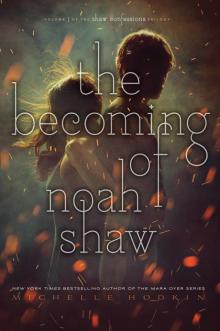 The Becoming of Noah Shaw
The Becoming of Noah Shaw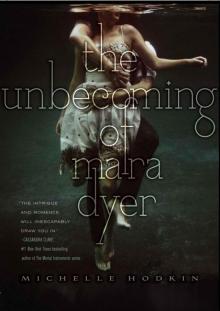 The Unbecoming of Mara Dyer
The Unbecoming of Mara Dyer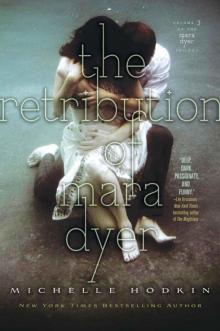 The Retribution of Mara Dyer
The Retribution of Mara Dyer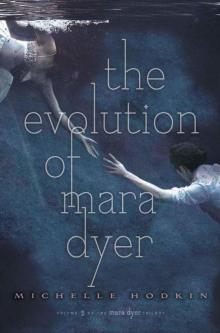 The Evolution of Mara Dyer
The Evolution of Mara Dyer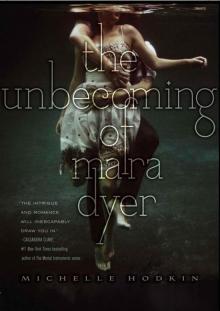 The Unbecoming of Mara Dyer md-1
The Unbecoming of Mara Dyer md-1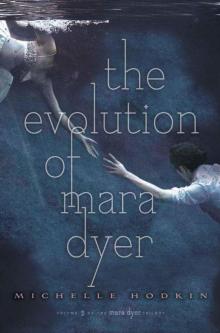 The Evolution of Mara Dyer md-2
The Evolution of Mara Dyer md-2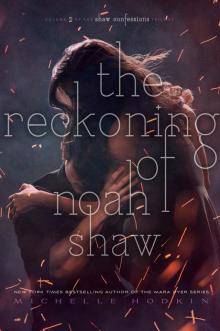 The Reckoning of Noah Shaw
The Reckoning of Noah Shaw